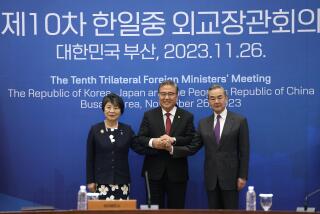A roundup of developments related to Asia’s economic crisis
- Share via
Heeding an international plan to bolster South Korea’s economy, two of the country’s biggest conglomerates promised to delay or halt major projects. But the cost-cutting plans by the Hyundai and LG groups weren’t specific on how they will meet a key government demand to shed subsidiaries. Taming South Korea’s unbridled conglomerates, or chaebol, is a major condition of the International Monetary Fund’s record $60-billion bailout package announced in December. South Korean conglomerates maintain a flock of subsidiaries under their wings. For example, Hyundai, the nation’s largest conglomerate, has 58 subsidiaries, and LG, the No. 3 conglomerate, has 54. The conglomerates are widely blamed for the country’s current economic crisis. At least eight of the nation’s 30 largest conglomerates collapsed under heavy debts last year, saddling banks with billions of dollars in bad loans and fueling the crisis.Hyundai said it will halt or delay billions of dollars in new investment projects, focus on key industries and improve the financial information it provides to the public. It said it will suspend indefinitely a $3-billion steel plant and sell its stake in Munhwa Ilbo, a money-losing national newspaper. Hyundai also promised to dispose of weak subsidiaries. LG’s restructuring program was broader and contained few details. It said it will streamline its business and readjust or scrap by 1999 as many as 90 weak or unprofitable projects.
*
Six British banks will roll over loans to South Korean banks until March 31, in a bid to ease South Korea’s economic crisis, lead bank HSBC Holdings said. HSBC, Britain’s largest bank in terms of assets, said the banks agreed to roll over the “maturity of their short-term money placements” with the South Korean banks to shore up the nation’s ability to manage its debts.
*
Bank of Japan said the nation’s economic growth remains sluggish with slow domestic demand hurting industrial production, employment and income. The central bank said corporate sentiment has weakened and the economy will remain stagnant for a while as companies continue to trim inventory and cut capital investment, and the government cuts spending. Still, the bank said it sees prices remaining stable with no signs of deflation. The central bank said that it would maintain its low interest-rate policy to shore up the economy. The government forecast a mere 0.1% economic growth for the year ending March 31, the worst since 1974, and a 1.9% growth for the year ending March 1999.
*
Japanese business bankruptcies reached an 11-year high in 1997, and debts of the failed firms were the most since the end of World War II, researchers said. In all, 16,365 businesses went under last year, 12.5% more than the year before and the most since 1986 when 17,476 companies collapsed, according to a report by Teikoku Databank Ltd. Teikoku said another wave of bankruptcies will sweep Japan in coming months because lenders are growing increasingly tightfisted as they try to clean up their own books. Japanese banks are struggling with a pile of bad real estate loans still left from the collapse of land prices early this decade. On average the bankruptcies were bigger than in previous years. Aggregate debts of the failed firms surged 75.4% from the year before to a postwar high of $107.9 billion.
*
Japan’s Semiconductor Equipment Assn. said worldwide orders of semiconductor-making equipment made in Japan rose 35.4% in November from the same month a year earlier to $855 million. While that’s the 10th straight month of increase in orders, it’s markedly less than the 86.3% surge in October.
*
Japan’s government proposed a $234-billion plan to shore up confidence in Japan’s banking system by using public money to protect depositors. The proposal, among six government bills in parliament, has been criticized by opposition politicians as a taxpayer-funded bailout of badly managed financial institutions.
*
Indonesia displayed its first major sign of economic reform with the announcement of its biggest-ever merger of private banks. Bank International Indonesia, one of the country’s largest private banks, said it would merge with Bank Dagang Nasional, Bank Tiara Asia and two unlisted banks to improve efficiency. It said the new entity would have assets of $5.9 billion and equity of $590 million, making it the largest private bank in the country.
KEY MARKETS
Market: Hong Kong
% change: +2.75%
*
Market: Philippines
% change: +11.3%
More to Read
Sign up for Essential California
The most important California stories and recommendations in your inbox every morning.
You may occasionally receive promotional content from the Los Angeles Times.













